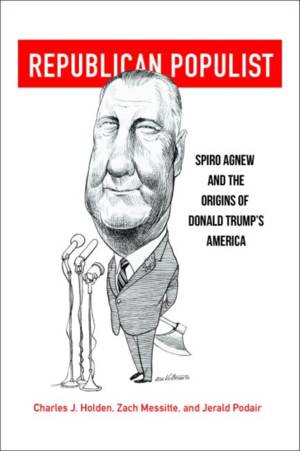
- Retrait gratuit dans votre magasin Club
- 7.000.000 titres dans notre catalogue
- Payer en toute sécurité
- Toujours un magasin près de chez vous
- Retrait gratuit dans votre magasin Club
- 7.000.0000 titres dans notre catalogue
- Payer en toute sécurité
- Toujours un magasin près de chez vous
Republican Populist
Spiro Agnew and the Origins of Donald Trump's America
Charles J Holden, Zach Messitte, Jerald PodairDescription
Typically a maligned figure in American political history, former vice president Spiro T. Agnew is often overlooked. Although he is largely remembered for his alliterative speeches, attacks on the media and East Coast intellectuals, and his resignation from office in 1973 in the wake of tax evasion charges, Agnew had a significant impact on the modern Republican Party that is underappreciated. It is impossible, in fact, to understand the current internal struggles of the Republican Party without understanding this populist "everyman" and prototypical middle-class striver who was one of the first proponents of what would become the ideology of Donald Trump's GOP.
Republican Populist examines Agnew's efforts to make the Republican Party representative of the "silent majority." Under the tutelage of a group of talented speechwriters assigned to Agnew by President Richard Nixon including Pat Buchanan and William Safire, Agnew crafted the populist-tinged, anti-establishment rhetoric that helped turn the Republican Party into a powerful national electoral force that has come to define American politics into the current era.
A fascinating political portrait of Agnew from his pre-vice presidential career through his scandal-driven fall from office and beyond, this book is a revelatory examination of Agnew's role as one of the founding fathers of the modern Republican Party and of the link between Agnew's "people's party" and the fraught party of populists and businessmen today.
Spécifications
Parties prenantes
- Auteur(s) :
- Editeur:
Contenu
- Nombre de pages :
- 272
- Langue:
- Anglais
Caractéristiques
- EAN:
- 9780813943268
- Date de parution :
- 28-10-19
- Format:
- Livre relié
- Format numérique:
- Genaaid
- Dimensions :
- 165 mm x 239 mm
- Poids :
- 498 g

Les avis
Nous publions uniquement les avis qui respectent les conditions requises. Consultez nos conditions pour les avis.






